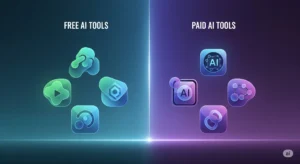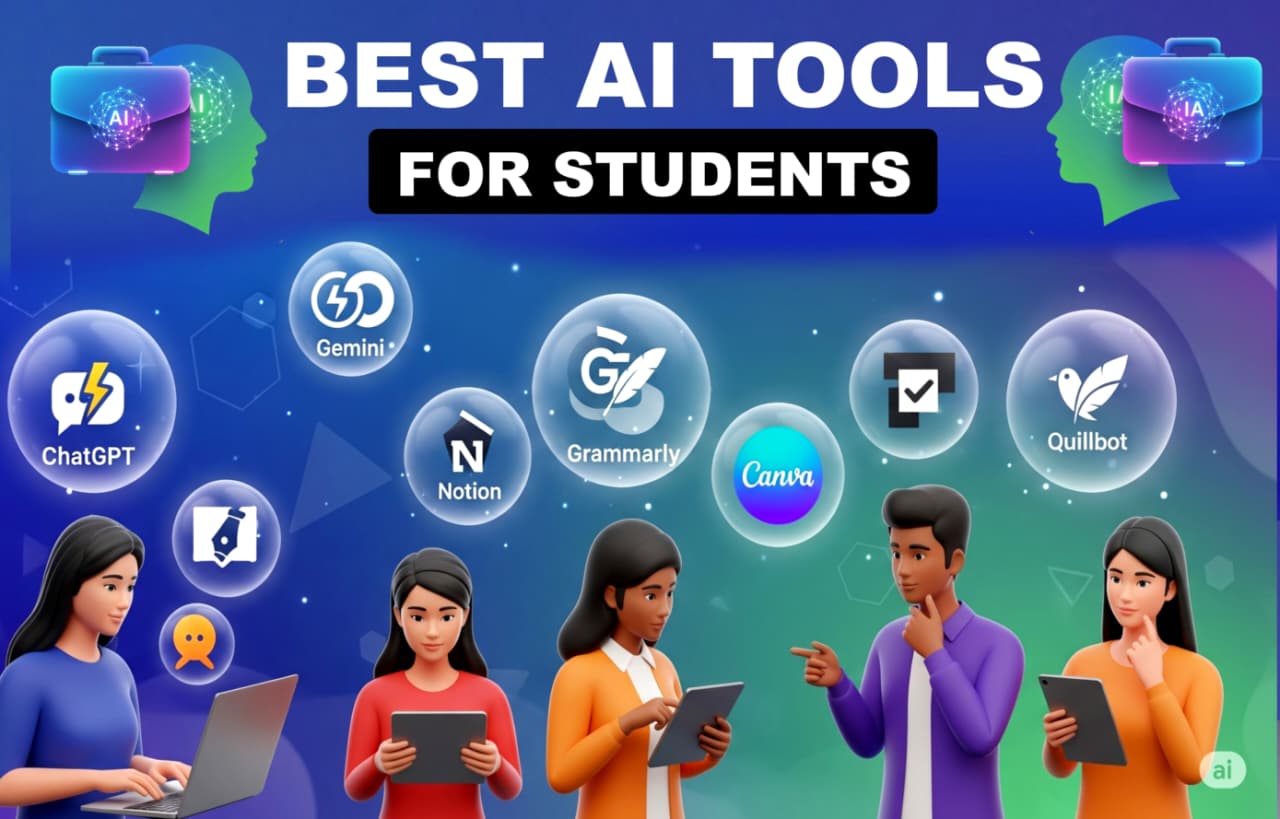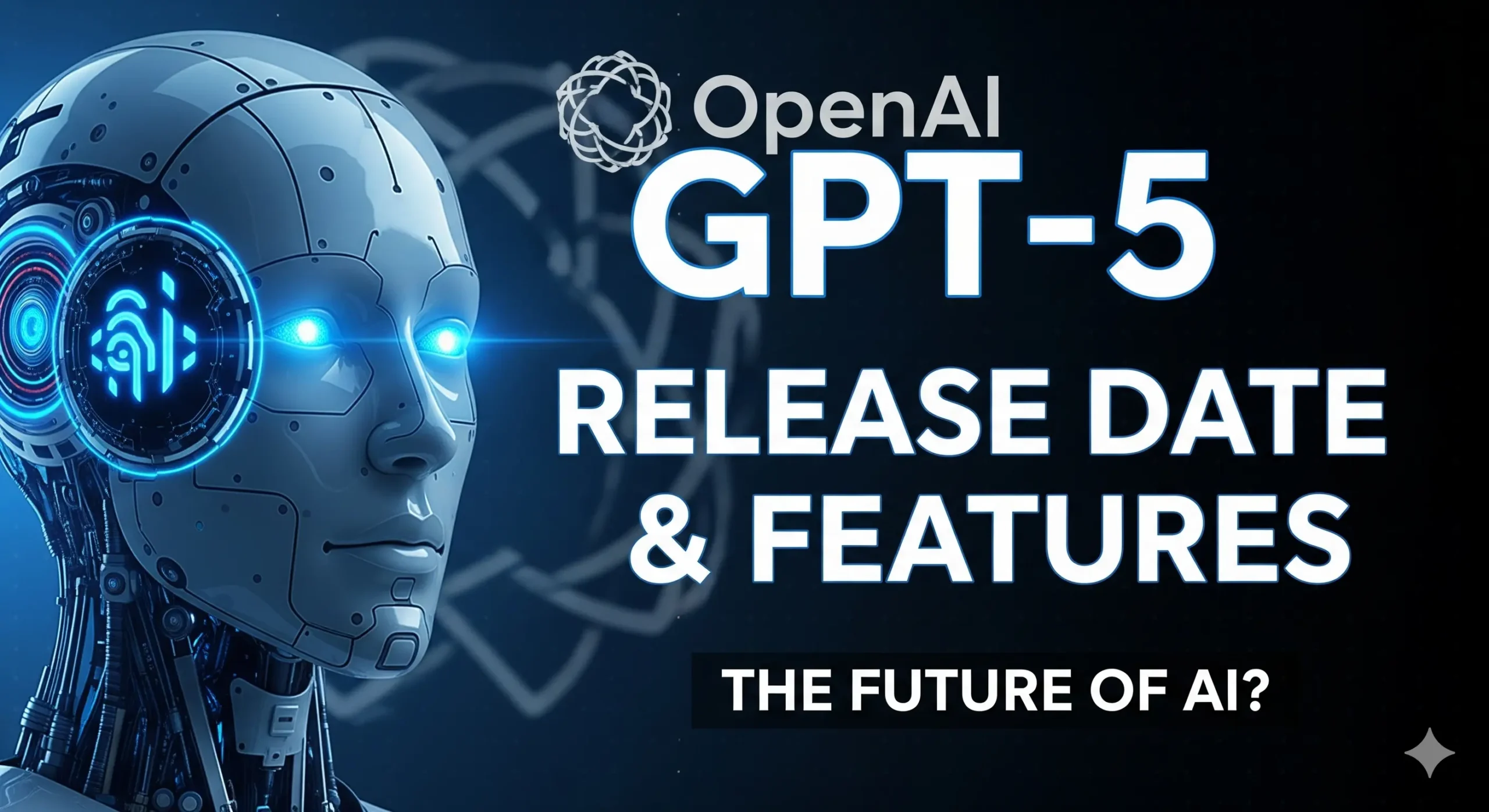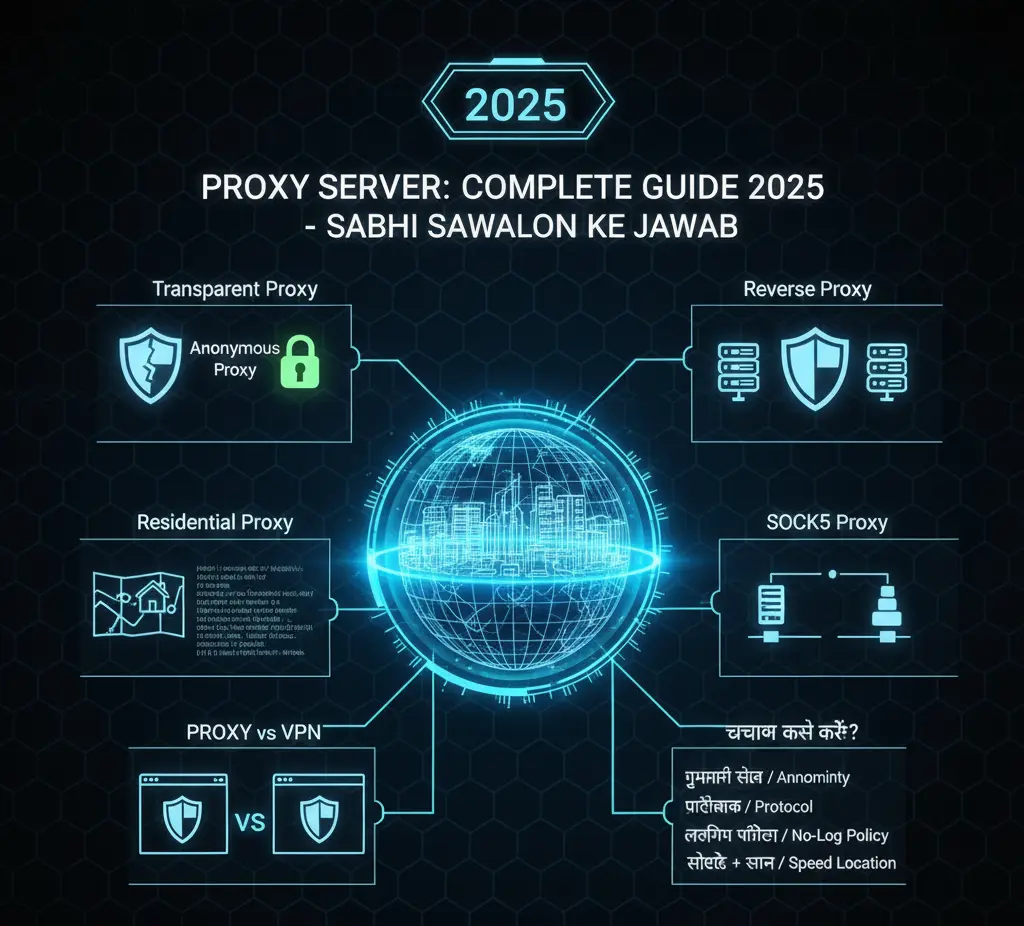The AI Revolution in Education: A Game-Changer for Students
Welcome to 2025, a time where artificial intelligence is no longer a futuristic concept but a vital part of our academic lives. For students, the integration of an ai tool for students has become a genuine game-changer, fundamentally transforming the way we learn, research, and prepare for our careers.
The days of slogging through countless library books or painstakingly writing every word of an essay are over. The best ai tools for students are here to act as your personal assistant, a research partner, and even a creative co-pilot. From solving complex mathematical equations to generating professional-looking presentations, the right ai tool for students can save you countless hours, reduce stress, and help you achieve academic excellence.
This guide is your definitive resource to navigate the world of AI in education. We’ll explore the best ai tools for students, breaking them down by category, and providing you with the knowledge to use them effectively for your studies, research, and future career. Whether you are a high school student, a college student, or a lifelong learner, these powerful ai tools for students will help you study smarter, not harder. You’ll quickly find that an effective ai tool for students is essential for staying ahead.
Categories of AI Tools for Students
AI tools are incredibly diverse, with each one designed to address a specific need. To make it easier to find what you’re looking for, we’ve organized the important AI tools for students into key categories.
1. AI Tools for Studying & Research
This category focuses on tools that help you understand complex topics, summarize information, and streamline your research process. They are your digital study buddies.
- Note-taking and Transcription:
- Otter.ai: This tool records and transcribes lectures, meetings, and interviews in real-time. It can identify different speakers, summarize key points, and create a searchable transcript. Click for Otter.ai
- Mindgrasp: An AI learning platform that can turn any uploaded content (videos, PDFs, articles) into summaries, notes, quizzes, and flashcards. Click for Mindgrasp
- Research & Summarization:
- Perplexity AI: Acts as a “conversational search engine” by providing summarized answers with linked sources, making it reliable for academic work. Link to Preplexity
- Consensus: A search engine that exclusively finds and summarizes peer-reviewed scientific research, perfect for building a literature review. Link to Consensus
- ChatPDF: Allows you to upload a PDF document and “chat” with it, asking questions, requesting summaries, and quickly finding specific information. Link to ChatPDF
- Data Analysis:
- Wolfram Alpha: A computational knowledge engine that can solve complex mathematical equations, provide step-by-step solutions, and analyze data for science and engineering subjects. Click for Wolfram
- Grammarly: While primarily for writing, its AI features can help you analyze text and improve clarity in your research papers. Click for Grammarly
2. AI Tools for Content Writing & Creativity
These are the tools that supercharge your writing and creative projects. From crafting essays to designing stunning visuals, they are a must-have for every student.
- Writing & Grammar Checkers:
- Grammarly: The gold standard for checking grammar, spelling, and punctuation. Its AI can also suggest rephrasing for clarity and check for plagiarism. Click for Grammarly
- QuillBot: An indispensable tool for paraphrasing and rewriting text to improve originality and fluency. It also includes a summarizer and citation generator. Click for QuillBot
- ProWritingAid: A powerful editor that goes beyond basic grammar, offering in-depth reports on style, repetitiveness, and consistency. Click for Pro Writing Aid
- Content Generation & Paraphrasing:
- ChatGPT & Gemini: Versatile chatbots that can brainstorm essay topics, draft outlines, and help overcome writer’s block by generating content on any subject. Link to ChatGPT
- Jasper: A content generation tool that can write long-form content, from essays to scripts, based on simple prompts. Link to Jasper
- Visual Content Creation:
- Canva AI (Magic Studio): A design platform with AI tools that can generate images from text, create presentations instantly, and simplify complex design tasks for posters and infographics. Link to Canva
- Midjourney: An advanced AI image generator that creates unique and artistic visuals from text prompts. It is highly popular for creative projects and digital art. Link to Midjourney
3. AI Tools for Coding & Development
For computer science students and aspiring developers, these tools are indispensable. They can help you write, debug, and understand code more efficiently.
- Code Generation:
- GitHub Copilot: An AI coding assistant that auto-completes code, suggests entire functions, and helps developers write code faster. It’s like having a pair programmer. Click for Github
- Amazon CodeWhisperer: An AI coding assistant that provides real-time code suggestions based on your comments and existing code, helping you build applications more efficiently. Click for Amazon CodeWhisperer
- Debugging & Learning:
- Replit: One more tool which is best ai tool for students. An online coding environment with built-in AI features that can help you write, debug, and understand code snippets without leaving the platform. Click for Replit
- ChatGPT: Can act as a coding tutor, explaining complex concepts, helping to find bugs, and providing clear examples for different programming languages also and best ai tool for students. Click for ChatGPT
4. AI Tools for Job Search & Career Development
Beyond academics, AI is a powerful ally for preparing for the professional world. These useful AI tools for students help you stand out in the competitive job market.
- Resume & Cover Letter Optimization:
- Careerflow.ai: This platform uses AI to help you build and optimize resumes, generate personalized cover letters, and track your job applications with an integrated CRM. Link for Careerflow
- ResumeWorded: An AI-powered resume and LinkedIn optimization tool that provides instant, actionable feedback to help you stand out to recruiters. Link for ResumeWorded
- Interview Preparation:
- Big Interview: A platform that uses AI to analyze your practice interview responses, providing feedback on your body language, tone, and filler words (like “um” and “uh”). Link for Big Interview
- Yoodli: An AI-powered speech coach that provides real-time feedback on your speaking clarity, pace, and delivery, perfect for practicing presentations or job interviews. Click for Yoodli
5. AI Tools for Teachers & Student Assessment
While this post is primarily for students, it’s worth noting how AI is assisting educators. Tools in this category help with grading, creating personalized learning plans, and fostering student engagement and and best ai tool for students.
- Lesson Planning & Material Generation:
- MagicSchool.ai & Eduaide.Ai: These platforms are specifically designed for teachers to generate academic content, lesson plans, quizzes, and rubrics based on specific topics and standards. Link to MagicSchool
- Automated Grading & Assessment:
- Gradescope: An AI tool that streamlines the grading process for handwritten assignments and exams, allowing instructors to grade faster and provide more consistent feedback. Link to Gradescope
- Turnitin: Primarily known for plagiarism detection, it now has AI features to help educators identify AI-generated text in student submissions. Link to Turnitin
- Student Engagement:
- Quizizz & Kahoot!: These platforms have integrated AI to help teachers instantly create interactive quizzes and games from any topic or document, boosting student participation and learning. Link for Quizizz
List of 15+ Best AI Tools for Students in 2025
Here is a detailed breakdown of the best AI tools for students, including their features, pros, cons, and pricing.
1. ChatGPT
The quintessential AI chatbot from OpenAI. It’s the most famous of all different AI tools for students.
- Features: Conversational AI, text generation, summarization, brainstorming, coding assistance, and creative writing. It can explain complex topics, write drafts, and even act as a tutor.
- Best Use Cases: Brainstorming essay topics, explaining difficult concepts, drafting emails to professors, writing code, and generating ideas for projects.
- Pricing: Free version with GPT-3.5. Paid plans (ChatGPT Plus) for access to GPT-4o, higher usage limits, and more advanced features.
- Pros: Highly versatile, easy to use, and excellent for a wide range of tasks. The free version is very capable.
- Cons: Can sometimes produce inaccurate or “hallucinated” information. Requires careful fact-checking.
2. Gemini (formerly Google Bard)
Google’s powerful conversational AI, deeply integrated with the Google ecosystem.
- Features: Real-time web access, image analysis, integration with Google Docs, Gmail, and other apps. Gemini 2.5 Pro is specifically designed for complex reasoning and learning tasks. The new Guided Learning mode provides step-by-step support for students.
- Best Use Cases: Researching with up-to-date information from the web, summarizing articles, generating presentations in Google Slides, and getting help with homework in a structured, guided way.
- Pricing: A free version is available. College students in select countries can get free access to Google AI Pro, which includes Gemini 2.5 Pro and NotebookLM.
- Pros: Access to the latest web data, seamless integration with Google Workspace, and the Guided Learning mode makes it a top choice for academic help.
- Cons: Can be slower than other chatbots for some tasks. Integration with non-Google apps is limited.
3. Grammarly
The gold standard for writing assistance, now with powerful AI features.
- Features: AI-powered grammar, spelling, punctuation, and style checker. It suggests rephrasing for clarity, checks for plagiarism, and provides writing feedback. The AI features can generate text, summarize documents, and help with brainstorming.
- Best Use Cases: Proofreading essays and research papers, improving the clarity of written assignments, and checking for plagiarism.
- Pricing: Free version with basic suggestions. Premium plans offer advanced features, including plagiarism detection and full-service AI writing.
- Pros: Incredibly accurate for grammar and spelling. Easy to integrate into browsers, Microsoft Word, and other platforms.
- Cons: The free version has limitations. The paid version can be expensive for some students.
4. QuillBot
An indispensable tool for paraphrasing and writing assistance.
- Features: Paraphraser, summarizer, grammar checker, and citation generator. The paraphraser has different modes (Standard, Fluency, Creative) to adjust the tone and style of your writing.
- Best Use Cases: Rewording sentences or paragraphs to improve clarity and originality, summarizing lengthy research papers, and generating citations in various academic formats.
- Pricing: Free version with limited words and modes. Premium plans offer unlimited use and all features.
- Pros: Excellent for rephrasing text to avoid accidental plagiarism. Very easy to use and a significant time-saver.
- Cons: Can sometimes create awkward or unnatural-sounding sentences in the free version.
5. Notion AI
AI built directly into the all-in-one workspace and note-taking app, Notion.
- Features: Automates common tasks within your notes and databases. Can summarize notes, translate text, brainstorm ideas, and draft content directly within your Notion pages.
- Best Use Cases: Creating to-do lists from lecture notes, generating a summary of a chapter, organizing research materials, and drafting reports or project outlines.
- Pricing: Notion has a free plan with limited AI use. Paid plans unlock full AI functionality.
- Pros: Deeply integrated into a powerful organization tool. Context-aware, so it works seamlessly with your existing notes and databases.
- Cons: Requires you to use Notion as your primary workspace to get the most value.
6. Perplexity AI
A research-focused AI chatbot that provides sourced, factual answers.
- Features: Acts as a “conversational search engine” by providing summarized answers with linked sources. It can perform deep research on specific topics and generate reports with citations.
- Best Use Cases: Finding quick, reliable information for essays or presentations, conducting initial literature reviews, and getting a concise overview of a topic with direct links to sources.
- Pricing: Free version with limited search queries. A Pro subscription offers unlimited queries and advanced features.
- Pros: Provides a list of sources, making it more trustworthy for academic work. Excellent for fact-checking.
- Cons: The free version can be restrictive for deep research.
7. Wolfram Alpha
A computational knowledge engine and a lifesaver for STEM students.
- Features: Computes complex mathematical equations, solves problems in science and engineering, provides detailed step-by-step solutions, and generates data visualizations.
- Best Use Cases: Solving calculus problems, getting step-by-step solutions for physics or chemistry equations, and analyzing data for a statistics class.
- Pricing: Free version with core functionality. A Pro subscription offers more computation time and features.
- Pros: Unparalleled accuracy for technical and scientific queries. It provides solutions, not just answers, which aids in learning.
- Cons: Not a general-purpose chatbot. It’s specifically for computational tasks.
8. Mendeley
While not a general AI tool, Mendeley is a researcher’s best friend with AI-powered features.
- Features: Reference manager that automatically extracts citation data from PDFs. It helps you organize your research papers and generate bibliographies. The newer versions use AI to suggest related articles.
- Best Use Cases: Organizing a library of research papers, generating in-text citations and bibliographies, and collaborating on research with a team.
- Pricing: Free for basic storage. Paid plans offer more cloud storage.
- Pros: Essential for academic writing and research papers. Saves a huge amount of time on citations.
- Cons: Primarily a reference manager, not a content generator.
9. Otter.ai
A powerful tool for transcribing audio and video.
- Features: Records and transcribes lectures, meetings, and interviews in real-time. It can identify different speakers, summarize key points, and create a searchable transcript.
- Best Use Cases: Recording and transcribing lectures so you can focus on listening, transcribing group study sessions, and taking notes for interviews for a research project and best ai tool for students who wants to pursue career in research.
- Pricing: Free version with a monthly transcription limit. Paid plans offer more minutes and advanced features.
- Pros: Highly accurate, especially for clear audio. Saves a ton of time on manual note-taking.
- Cons: Accuracy can drop with poor audio quality or multiple speakers talking at once.
10. Canva AI (Magic Studio)
The popular design platform now has an arsenal of AI tools.
- Features: Text-to-Image generation (Magic Media), Magic Write for content creation, Magic Design for presentations, and AI-powered background removal.
- Best Use Cases: Creating stunning presentations, designing posters for school events, generating unique images for a project, and making professional-looking social media visuals.
- Pricing: Canva has a very generous free plan with limited AI use. Paid plans (Canva Pro) unlock all AI features and a massive library of assets.
- Pros: Extremely user-friendly and great for non-designers. The AI features simplify complex design tasks.
- Cons: The free version has daily limits on AI generation. The output can be generic without detailed prompts.
11. Jasper
A content creation tool favored by marketers but useful for students.
- Features: AI-powered content generation, including essays, blog posts, stories, and marketing copy. It can write long-form content from a simple prompt.
- Best Use Cases: Getting a head start on a long essay, creating scripts for a video project, or generating ai tools for content writing for a student club’s blog.
- Pricing: Paid only.
- Pros: Can generate high-quality, long-form content quickly.
- Cons: No free plan, which makes it less accessible for many students. It’s a paid tool designed for professional use.
12. GitHub Copilot
An AI coding assistant for developers.
- Features: Autocompletes code, suggests entire functions, and translates natural language comments into code. It’s a lifesaver for writing, debugging, and understanding code.
- Best Use Cases: Programming students can use it to speed up coding, learn new languages, and get help debugging.
- Pricing: Paid. Students can get a free subscription by verifying their academic status.
- Pros: Hugely boosts productivity for coding. It’s like having a senior developer pair-programming with you.
- Cons: Can generate bugs or insecure code. You still need to understand the code it produces.
13. Socratic by Google
A homework helper app designed for school students.
- Features: Uses AI to provide step-by-step explanations for homework problems, especially in math, science, literature, and social studies. You can take a photo of a question and it provides resources to help you solve it and best ai tool for students those are in school.
- Best Use Cases: Getting help with challenging homework questions, understanding complex concepts with visual aids, and preparing for tests.
- Pricing: Free.
- Pros: Completely free and great for quick, on-the-go homework help.
- Cons: Designed for school-level questions, not complex college-level research.
14. Mindgrasp
An AI learning platform that can turn any content into notes and quizzes.
- Features: Summarizes lecture videos, PDFs, and articles. It can also generate notes, quizzes, and flashcards from any content you upload.
- Best Use Cases: Automatically creating study materials from your course books, generating practice quizzes for an exam, and quickly summarizing long readings.
- Pricing: Free trial with limited features. Paid plans for full access.
- Pros: Transforms passive content into active learning tools, saving tons of study time.
- Cons: The free trial is limited.
15. Consensus
A research tool for students and researchers.
- Features: Finds and summarizes peer-reviewed scientific research. It helps you get answers to research questions by analyzing thousands of academic papers.
- Best Use Cases: Finding evidence for a research paper, quickly understanding the consensus on a scientific topic, and building a literature review.
- Pricing: Free version with limited searches. Paid plans for unlimited searches and more features.
- Pros: Highly accurate and reliable for academic research as it only uses scientific literature.
- Cons: Limited to academic research, not a general-purpose tool.
16. Grammarly Go
An extension of Grammarly, this tool is designed for quick, in-the-moment AI help and best ai tool for students.
- Features: Generates and refines text in real-time within your browser or apps. It can compose emails, rewrite sentences, and adjust the tone of your message.
- Best Use Cases: Drafting a quick professional email, rephrasing a paragraph in a document, or crafting social media posts.
- Pricing: Included with Grammarly Premium.
- Pros: Seamless integration and context-aware writing.
- Cons: Not available as a standalone tool.
Free AI Tools for Students

Free and Paid Ai tools for students
Many of the best AI tools offer a powerful free version. This is great news for students on a budget. Here is a comparison of the top free AI tools for students.
Best AI Tools for College Students vs. School Students
The needs of a high school student are different from those of a college student, and the ai tool for students they use often reflects this.
For School Students: The primary ai tool for students in this age group focuses on foundational skills. Tools like Socratic and Wolfram Alpha are fantastic as a first ai tool for students for homework and understanding core concepts. They provide direct solutions with explanations, which is perfect for building a strong knowledge base. Canva AI is also a great ai tool for students for creating visuals for school projects and presentations. This category of ai tool for students helps build confidence and comprehension.
For College Students: The emphasis shifts to research, productivity, and career preparation. A college student needs a more sophisticated ai tool for students to manage complex academic tasks. Perplexity AI and Consensus are invaluable as a research ai tool for students for literature reviews. Notion AI is a key ai tool for students that helps with project management and organizing large volumes of notes. For aspiring professionals, GitHub Copilot is a necessity as an ai tool for students for coding, and specialized ai tool for students for job seekers are a must for landing internships. The stakes are higher, so the ai tool for students must be more sophisticated.
AI Tools Beyond Studies
Artificial intelligence isn’t just for your classes. This powerful ai tool for students can also help you outside of the academic sphere, preparing you for the real world.
- Job Hunting & Career Prep: AI tool for students focused on job hunting are now essential. Platforms like Jobscan use an ai tool for students to optimize your resume for Applicant Tracking Systems (ATS). Careerflow helps you track applications, and Yoodli is another ai tool for students that gives you feedback on your interview skills. The goal of this type of ai tool for students is to help you get past automated systems and land an interview. For more ideas on how to earn money, check out our guide on 10 Legit Ways to Earn Online.
- Branding & Business Development: Whether you’re starting a side hustle or building a personal brand, an ai tool for students can help. Use Canva AI for logo design, and Jasper or Copy.ai can generate captivating copy. The ability to use an ai tool for students for content creation and image generation is a huge advantage.
- AI for Teachers & Researchers: It’s worth a mention that the same ai tool for students are transforming the work of educators. AI is being used for student assessment, creating personalized learning pathways, and even automating grading. Gradescope is a prime example of an ai tool for students that helps teachers streamline the grading process. This symbiotic relationship between students, teachers, and a well-chosen ai tool for students is at the heart of the future of education.
FAQs Section
- What are the best AI tools for students in 2025? The best ai tool for students is one that fits your specific needs. For an all-around assistant, ChatGPT and Gemini are top-tier. For writing, Grammarly and QuillBot are essential. For research, Perplexity AI and Consensus are invaluable. And for technical tasks, Wolfram Alpha and GitHub Copilot are leaders in their fields. You can also explore Top 10 BTech Project Ideas for Computer Science Students to find projects that leverage these technologies.
- Are AI tools free for students? Many free ai tool for students are available, including free versions of popular platforms like ChatGPT, Gemini, Grammarly, QuillBot, and Canva. These free plans often have limitations but are more than sufficient for most academic tasks. A great ai tool for students is often available at a discount or for free with academic verification. For those looking for career experience, check out our list of Top 10 Free Internships for Computer Science Students.
- Which AI tool is best for research & note-taking? For research, Perplexity AI is a leading choice because it provides clear sources for its answers, making it a reliable ai tool for students for academic work. Consensus is also excellent for finding and summarizing scientific papers. For note-taking, Notion AI integrates seamlessly into your workspace, and Otter.ai is a game-changer as an ai tool for students for transcribing lectures and meetings.
- Can AI tools help with job search? Absolutely. AI tool for students are revolutionizing the job search process. Platforms like Jobscan and Careerflow use AI to optimize your resume for Applicant Tracking Systems (ATS). Other ai tool for students can generate personalized cover letters, help you practice for interviews, and even optimize your LinkedIn profile to attract recruiters.











How to Easily Earn Money Online Without Investment - DecodePC | India's Best Tech Agency |
[…] platforms efficiently. AI tools are also revolutionizing mobile productivity; students can use the best AI tools for students to create content, automate tasks, or even manage their online […]